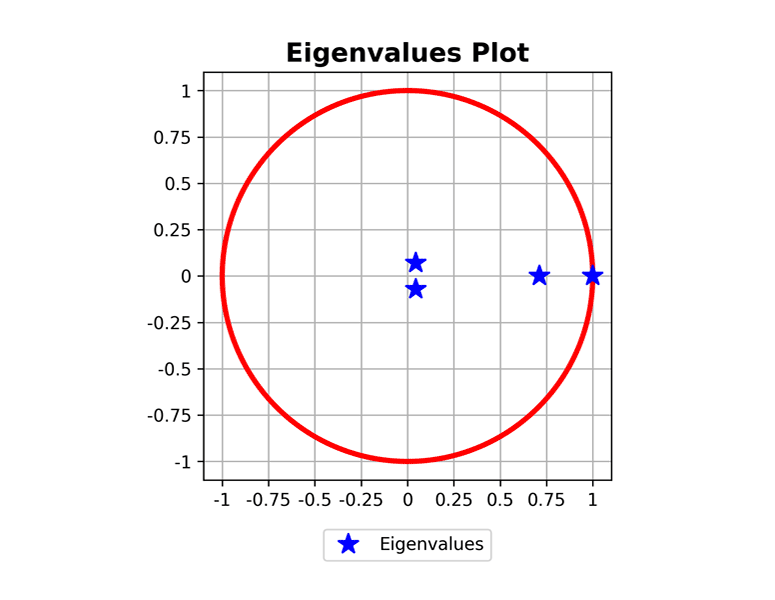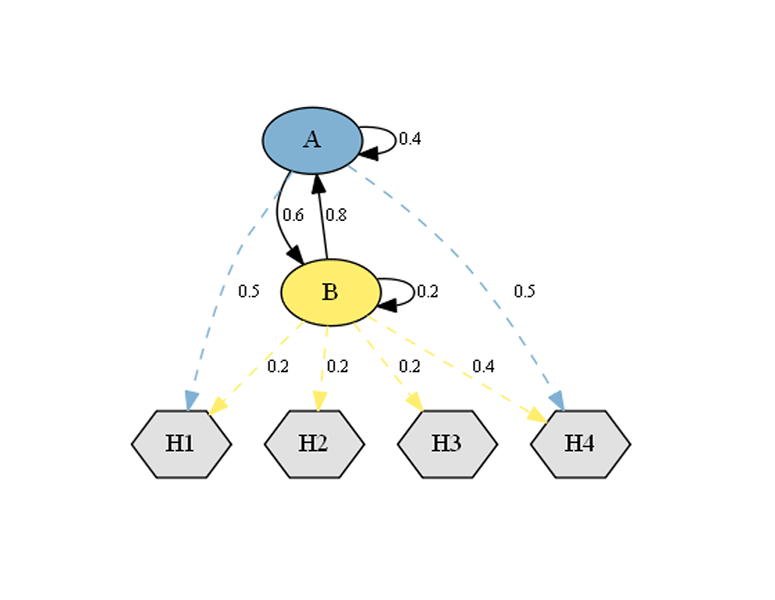PyDTMC is a full-featured and lightweight library for discrete-time Markov chains analysis. It provides classes and functions for creating, manipulating, simulating and visualizing Markov processes.
<table>
<tr>
<td align="right">Status:</td>
<td align="left">
<a href="https://github.com/TommasoBelluzzo/PyDTMC/actions/workflows/continuous_integration.yml"><img alt="Build" src="https://img.shields.io/github/workflow/status/TommasoBelluzzo/PyDTMC/Continuous%20Integration?style=flat&label=Build&color=1081C2"/></a>
<a href="https://pydtmc.readthedocs.io/"><img alt="Docs" src="https://img.shields.io/readthedocs/pydtmc?style=flat&label=Docs&color=1081C2"/></a>
<a href="https://coveralls.io/github/TommasoBelluzzo/PyDTMC?branch=master"><img alt="Coverage" src="https://img.shields.io/coveralls/github/TommasoBelluzzo/PyDTMC?style=flat&label=Coverage&color=1081C2"/></a>
</td>
</tr>
<tr>
<td align="right">Info:</td>
<td align="left">
<a href="#"><img alt="License" src="https://img.shields.io/github/license/TommasoBelluzzo/PyDTMC?style=flat&label=License&color=1081C2"/></a>
<a href="#"><img alt="Lines" src="https://img.shields.io/tokei/lines/github/TommasoBelluzzo/PyDTMC?style=flat&label=Lines&color=1081C2"/></a>
<a href="#"><img alt="Size" src="https://img.shields.io/github/repo-size/TommasoBelluzzo/PyDTMC?style=flat&label=Size&color=1081C2"/></a>
</td>
</tr>
<tr>
<td align="right">PyPI:</td>
<td align="left">
<a href="https://pypi.org/project/PyDTMC/"><img alt="Version" src="https://img.shields.io/pypi/v/PyDTMC?style=flat&label=Version&color=1081C2"/></a>
<a href="https://pypi.org/project/PyDTMC/"><img alt="Python" src="https://img.shields.io/pypi/pyversions/PyDTMC?style=flat&label=Python&color=1081C2"/></a>
<a href="https://pypi.org/project/PyDTMC/"><img alt="Wheel" src="https://img.shields.io/pypi/wheel/PyDTMC?style=flat&label=Wheel&color=1081C2"/></a>
<a href="https://pypi.org/project/PyDTMC/"><img alt="Downloads" src="https://img.shields.io/pypi/dm/PyDTMC?style=flat&label=Downloads&color=1081C2"/></a>
</td>
</tr>
<tr>
<td align="right">Conda:</td>
<td align="left">
<a href="https://anaconda.org/conda-forge/pydtmc/"><img alt="Version" src="https://img.shields.io/conda/vn/conda-forge/pydtmc?style=flat&label=Version"/></a>
<a href="https://anaconda.org/conda-forge/pydtmc/"><img alt="Python" src="https://img.shields.io/pypi/pyversions/PyDTMC?style=flat&label=Python&color=1081C2"/></a>
<a href="https://anaconda.org/conda-forge/pydtmc/"><img alt="Platforms" src="https://img.shields.io/conda/pn/conda-forge/pydtmc?style=flat&label=Platforms&color=1081C2"/></a>
<a href="https://anaconda.org/conda-forge/pydtmc/"><img alt="Downloads" src="https://img.shields.io/conda/dn/conda-forge/pydtmc?style=flat&label=Downloads&color=1081C2"/></a>
</td>
</tr>
<tr>
<td align="right">Donation:</td>
<td align="left">
<a href="https://www.paypal.com/cgi-bin/webscr?cmd=_s-xclick&hosted_button_id=D8LH6DNYN7EN8"><img alt="PayPal" src="https://www.paypalobjects.com/en_US/i/btn/btn_donate_LG.gif"/></a>
</td>
</tr>
</table>
## Requirements
The `Python` environment must include the following packages:
* [Matplotlib](https://matplotlib.org/)
* [NetworkX](https://networkx.github.io/)
* [NumPy](https://www.numpy.org/)
* [SciPy](https://www.scipy.org/)
*Notes:*
* It's recommended to install [Graphviz](https://www.graphviz.org/) and [pydot](https://pypi.org/project/pydot/) before using the `plot_graph` function.
* The packages [pytest](https://pytest.org/) and [pytest-benchmark](https://pypi.org/project/pytest-benchmark/) are required for performing unit tests.
* The package [Sphinx](https://www.sphinx-doc.org/) is required for building the package documentation.
## Installation & Upgrade
[PyPI](https://pypi.org/):
```sh
$ pip install PyDTMC
$ pip install --upgrade PyDTMC
```
[Git](https://git-scm.com/):
```sh
$ pip install https://github.com/TommasoBelluzzo/PyDTMC/tarball/master
$ pip install --upgrade https://github.com/TommasoBelluzzo/PyDTMC/tarball/master
$ pip install git+https://github.com/TommasoBelluzzo/PyDTMC.git#egg=PyDTMC
$ pip install --upgrade git+https://github.com/TommasoBelluzzo/PyDTMC.git#egg=PyDTMC
```
[Conda](https://docs.conda.io/):
```sh
$ conda install -c conda-forge pydtmc
$ conda update -c conda-forge pydtmc
$ conda install -c tommasobelluzzo pydtmc
$ conda update -c tommasobelluzzo pydtmc
```
## Usage: MarkovChain Class
The `MarkovChain` class can be instantiated as follows:
```console
>>> p = [[0.2, 0.7, 0.0, 0.1], [0.0, 0.6, 0.3, 0.1], [0.0, 0.0, 1.0, 0.0], [0.5, 0.0, 0.5, 0.0]]
>>> mc = MarkovChain(p, ['A', 'B', 'C', 'D'])
>>> print(mc)
DISCRETE-TIME MARKOV CHAIN
SIZE: 4
RANK: 4
CLASSES: 2
> RECURRENT: 1
> TRANSIENT: 1
ERGODIC: NO
> APERIODIC: YES
> IRREDUCIBLE: NO
ABSORBING: YES
MONOTONE: NO
REGULAR: NO
REVERSIBLE: YES
SYMMETRIC: NO
```
Below a few examples of `MarkovChain` properties:
```console
>>> print(mc.is_ergodic)
False
>>> print(mc.recurrent_states)
['C']
>>> print(mc.transient_states)
['A', 'B', 'D']
>>> print(mc.steady_states)
[array([0.0, 0.0, 1.0, 0.0])]
>>> print(mc.is_absorbing)
True
>>> print(mc.fundamental_matrix)
[[1.50943396, 2.64150943, 0.41509434]
[0.18867925, 2.83018868, 0.30188679]
[0.75471698, 1.32075472, 1.20754717]]
>>> print(mc.kemeny_constant)
5.547169811320755
>>> print(mc.entropy_rate)
0.0
```
Below a few examples of `MarkovChain` methods:
```console
>>> print(mc.absorption_probabilities())
[1.0 1.0 1.0]
>>> print(mc.expected_rewards(10, [2, -3, 8, -7]))
[44.96611926, 52.03057032, 88.00000000, 51.74779651]
>>> print(mc.expected_transitions(2))
[[0.0850, 0.2975, 0.0000, 0.0425]
[0.0000, 0.3450, 0.1725, 0.0575]
[0.0000, 0.0000, 0.7000, 0.0000]
[0.1500, 0.0000, 0.1500, 0.0000]]
>>> print(mc.first_passage_probabilities(5, 3))
[[0.5000, 0.0000, 0.5000, 0.0000]
[0.0000, 0.3500, 0.0000, 0.0500]
[0.0000, 0.0700, 0.1300, 0.0450]
[0.0000, 0.0315, 0.1065, 0.0300]
[0.0000, 0.0098, 0.0761, 0.0186]]
>>> print(mc.hitting_probabilities([0, 1]))
[1.0, 1.0, 0.0, 0.5]
>>> print(mc.mean_absorption_times())
[4.56603774, 3.32075472, 3.28301887]
>>> print(mc.mean_number_visits())
[[0.50943396, 2.64150943, INF, 0.41509434]
[0.18867925, 1.83018868, INF, 0.30188679]
[0.00000000, 0.00000000, INF, 0.00000000]
[0.75471698, 1.32075472, INF, 0.20754717]]
>>> print(mc.simulate(10, seed=32))
['D', 'A', 'B', 'B', 'C', 'C', 'C', 'C', 'C', 'C', 'C']
```
```console
>>> sequence = ["A"]
>>> for i in range(1, 11):
... current_state = sequence[-1]
... next_state = mc.next(current_state, seed=32)
... print((' ' if i < 10 else '') + f'{i}) {current_state} -> {next_state}')
... sequence.append(next_state)
1) A -> B
2) B -> C
3) C -> C
4) C -> C
5) C -> C
6) C -> C
7) C -> C
8) C -> C
9) C -> C
10) C -> C
```
Below a few examples of `MarkovChain` plotting functions; in order to display the output of plots immediately, the [interactive mode](https://matplotlib.org/stable/users/interactive.html#interactive-mode) of [Matplotlib](https://matplotlib.org/) must be turned on:
```console
>>> plot_eigenvalues(mc, dpi=300)
>>> plot_graph(mc, dpi=300)
>>> plot_sequence(mc, 10, plot_type='histogram', dpi=300)
>>> plot_sequence(mc, 10, plot_type='heatmap', dpi=300)
>>> plot_sequence(mc, 10, plot_type='matrix', dpi=300)
>>> plot_redistributions(mc, 10, plot_type='heatmap', dpi=300)
>>> plot_redistributions(mc, 10, plot_type='projection', dpi=300)
```

## Usage: HiddenMarkovModel Class
The `HiddenMarkovModel` class can be instantiated as follows:
```console
>>> p = [[0.4, 0.6], [0.8, 0.2]]
>>> states = ['A', 'B']
>>> e = [[0.5, 0.0, 0.0, 0.5], [0.2, 0.2, 0.2, 0.4]]
>>> symbols = ['H1', 'H2', 'H3', 'H4']
>>> hmm = HiddenMarkovModel(p, e, states, symbols)
>>> print(hmm)
HIDDEN MARKOV MODEL
STATES: 2
SYMBOLS: 4
ERGODIC: NO
REGULAR: NO
```
Below a few examples of `HiddenMarkovModel` methods:
```console
>>> sim_states, sim_symbols = hmm.simulate(12, seed=1488)
>>> print(sim_states)
['B', 'A', 'A', 'A', 'B', 'A', 'A']
>>> print(sim_symbols)
['H2', 'H4', 'H4', 'H4', 'H3', 'H4', 'H4']
>>> est_hmm = hmm.estimate(states, symbols, sim_states, sim_symbols)
>>> print(est_hmm.p)
[[0.75, 0.25]
[1.00, 0.00]]
>>> print(est_hmm.e)
[[0.0, 0.0, 0.0, 1.0]
[0.0, 0.5, 0.5, 0.0]]
>>> dec_lp, dec_posterior, dec_backward, dec_forward, _ = hmm.decode(sim_symbols)
>>> print(dec_lp)
-8.77549587
>>> print(dec_posterior)
[[0.00000000, 0.84422968, 0.41785105, 0.84422968, 0.00000000, 0.82089552, 0.52238806]
[1.00000000, 0.15577032, 0.58214895, 0.15577032, 1.00000000, 0.17910448, 0.47761194]]
>>> print(dec_backward)
[[1.50000000, 0.88942581, 1.01307561, 0.79988630, 1.31154065, 0.94776119, 0.98507463, 1.00000000]
[0.50000000, 1.00000000, 0.93462194, 1.21887436, 0.43718022, 1.00000000, 1.07462687, 1.00000000]]
>>> print(dec_forward)
[[0.50000000, 0.00000000, 0.83333333, 0.52238806, 0.64369311, 0.00000000, 0.83333333 0.52238806]
[0.50000000, 1.00000000, 0.16666667, 0.47761194, 0.35630689, 1.00000000, 0.16666667 0.47761194]]
>>> pre_lp, pre_states = hmm.predict('viterbi', sim_symbols)
>>> print(pre_lp)
-13.24482936
>>> print(pre_states)
['B', 'A', 'B', 'A', 'B', 'A', 'B']
```
Below a few examples of `HiddenMarkovModel` plotting functions; in order to display the output of plots immediately, the [interactive mode](https://matplotlib.org/stable/users/interactive.html#interactive-mode) of [Matplotlib](https://matplotlib.org/) must be turned on:
```console
>>> plot_graph(hmm, dpi=300)
>>> plot_sequence(hmm, 10, plot_type='histogram', dpi=300)
>>> plot_sequence(hmm, 10, plot_type='heatmap', dpi=300)
>>> plot_sequence(hmm, 10, plot_type='matrix', dpi=300)
>>> plot_trellis(hmm, 10, dpi=300)
```

Raw data
{
"_id": null,
"home_page": "https://github.com/TommasoBelluzzo/PyDTMC",
"name": "PyDTMC",
"maintainer": "Tommaso Belluzzo",
"docs_url": null,
"requires_python": ">=3.8",
"maintainer_email": "tommaso.belluzzo@gmail.com",
"keywords": "markov-chain,markov-chains,markov-model,markov-models,markov-state-model,markov-state-models,hidden-markov-model,hidden-markov-models,mathematics,statistics,probability,stochastic-process,stochastic-processes,analysis,fitting,simulation",
"author": "Tommaso Belluzzo",
"author_email": "tommaso.belluzzo@gmail.com",
"download_url": "https://files.pythonhosted.org/packages/aa/67/c8fab1ae44b40714ac2daf695622d69173b59568a39fb07c9afc8a6ac9f0/PyDTMC-8.6.0.tar.gz",
"platform": "any",
"description": "PyDTMC is a full-featured and lightweight library for discrete-time Markov chains analysis. It provides classes and functions for creating, manipulating, simulating and visualizing Markov processes.\n\n<table>\n <tr>\n <td align=\"right\">Status:</td>\n <td align=\"left\">\n <a href=\"https://github.com/TommasoBelluzzo/PyDTMC/actions/workflows/continuous_integration.yml\"><img alt=\"Build\" src=\"https://img.shields.io/github/workflow/status/TommasoBelluzzo/PyDTMC/Continuous%20Integration?style=flat&label=Build&color=1081C2\"/></a>\n <a href=\"https://pydtmc.readthedocs.io/\"><img alt=\"Docs\" src=\"https://img.shields.io/readthedocs/pydtmc?style=flat&label=Docs&color=1081C2\"/></a>\n <a href=\"https://coveralls.io/github/TommasoBelluzzo/PyDTMC?branch=master\"><img alt=\"Coverage\" src=\"https://img.shields.io/coveralls/github/TommasoBelluzzo/PyDTMC?style=flat&label=Coverage&color=1081C2\"/></a>\n </td>\n </tr>\n <tr>\n <td align=\"right\">Info:</td>\n <td align=\"left\">\n <a href=\"#\"><img alt=\"License\" src=\"https://img.shields.io/github/license/TommasoBelluzzo/PyDTMC?style=flat&label=License&color=1081C2\"/></a>\n <a href=\"#\"><img alt=\"Lines\" src=\"https://img.shields.io/tokei/lines/github/TommasoBelluzzo/PyDTMC?style=flat&label=Lines&color=1081C2\"/></a>\n <a href=\"#\"><img alt=\"Size\" src=\"https://img.shields.io/github/repo-size/TommasoBelluzzo/PyDTMC?style=flat&label=Size&color=1081C2\"/></a>\n </td>\n </tr>\n <tr>\n <td align=\"right\">PyPI:</td>\n <td align=\"left\">\n <a href=\"https://pypi.org/project/PyDTMC/\"><img alt=\"Version\" src=\"https://img.shields.io/pypi/v/PyDTMC?style=flat&label=Version&color=1081C2\"/></a>\n <a href=\"https://pypi.org/project/PyDTMC/\"><img alt=\"Python\" src=\"https://img.shields.io/pypi/pyversions/PyDTMC?style=flat&label=Python&color=1081C2\"/></a>\n <a href=\"https://pypi.org/project/PyDTMC/\"><img alt=\"Wheel\" src=\"https://img.shields.io/pypi/wheel/PyDTMC?style=flat&label=Wheel&color=1081C2\"/></a>\n <a href=\"https://pypi.org/project/PyDTMC/\"><img alt=\"Downloads\" src=\"https://img.shields.io/pypi/dm/PyDTMC?style=flat&label=Downloads&color=1081C2\"/></a>\n </td>\n </tr>\n <tr>\n <td align=\"right\">Conda:</td>\n <td align=\"left\">\n <a href=\"https://anaconda.org/conda-forge/pydtmc/\"><img alt=\"Version\" src=\"https://img.shields.io/conda/vn/conda-forge/pydtmc?style=flat&label=Version\"/></a>\n <a href=\"https://anaconda.org/conda-forge/pydtmc/\"><img alt=\"Python\" src=\"https://img.shields.io/pypi/pyversions/PyDTMC?style=flat&label=Python&color=1081C2\"/></a>\n <a href=\"https://anaconda.org/conda-forge/pydtmc/\"><img alt=\"Platforms\" src=\"https://img.shields.io/conda/pn/conda-forge/pydtmc?style=flat&label=Platforms&color=1081C2\"/></a>\n <a href=\"https://anaconda.org/conda-forge/pydtmc/\"><img alt=\"Downloads\" src=\"https://img.shields.io/conda/dn/conda-forge/pydtmc?style=flat&label=Downloads&color=1081C2\"/></a>\n </td>\n </tr>\n <tr>\n <td align=\"right\">Donation:</td>\n <td align=\"left\">\n <a href=\"https://www.paypal.com/cgi-bin/webscr?cmd=_s-xclick&hosted_button_id=D8LH6DNYN7EN8\"><img alt=\"PayPal\" src=\"https://www.paypalobjects.com/en_US/i/btn/btn_donate_LG.gif\"/></a>\n </td>\n </tr>\n</table>\n\n## Requirements\n\nThe `Python` environment must include the following packages:\n\n* [Matplotlib](https://matplotlib.org/)\n* [NetworkX](https://networkx.github.io/)\n* [NumPy](https://www.numpy.org/)\n* [SciPy](https://www.scipy.org/)\n\n*Notes:*\n\n* It's recommended to install [Graphviz](https://www.graphviz.org/) and [pydot](https://pypi.org/project/pydot/) before using the `plot_graph` function.\n* The packages [pytest](https://pytest.org/) and [pytest-benchmark](https://pypi.org/project/pytest-benchmark/) are required for performing unit tests.\n* The package [Sphinx](https://www.sphinx-doc.org/) is required for building the package documentation.\n\n## Installation & Upgrade\n\n[PyPI](https://pypi.org/):\n\n```sh\n$ pip install PyDTMC\n$ pip install --upgrade PyDTMC\n```\n\n[Git](https://git-scm.com/):\n\n```sh\n$ pip install https://github.com/TommasoBelluzzo/PyDTMC/tarball/master\n$ pip install --upgrade https://github.com/TommasoBelluzzo/PyDTMC/tarball/master\n\n$ pip install git+https://github.com/TommasoBelluzzo/PyDTMC.git#egg=PyDTMC\n$ pip install --upgrade git+https://github.com/TommasoBelluzzo/PyDTMC.git#egg=PyDTMC\n```\n\n[Conda](https://docs.conda.io/):\n\n```sh\n$ conda install -c conda-forge pydtmc\n$ conda update -c conda-forge pydtmc\n\n$ conda install -c tommasobelluzzo pydtmc\n$ conda update -c tommasobelluzzo pydtmc\n```\n\n## Usage: MarkovChain Class\n\nThe `MarkovChain` class can be instantiated as follows:\n\n```console\n>>> p = [[0.2, 0.7, 0.0, 0.1], [0.0, 0.6, 0.3, 0.1], [0.0, 0.0, 1.0, 0.0], [0.5, 0.0, 0.5, 0.0]]\n>>> mc = MarkovChain(p, ['A', 'B', 'C', 'D'])\n>>> print(mc)\n\nDISCRETE-TIME MARKOV CHAIN\n SIZE: 4\n RANK: 4\n CLASSES: 2\n > RECURRENT: 1\n > TRANSIENT: 1\n ERGODIC: NO\n > APERIODIC: YES\n > IRREDUCIBLE: NO\n ABSORBING: YES\n MONOTONE: NO\n REGULAR: NO\n REVERSIBLE: YES\n SYMMETRIC: NO\n```\n\nBelow a few examples of `MarkovChain` properties:\n\n```console\n>>> print(mc.is_ergodic)\nFalse\n\n>>> print(mc.recurrent_states)\n['C']\n\n>>> print(mc.transient_states)\n['A', 'B', 'D']\n\n>>> print(mc.steady_states)\n[array([0.0, 0.0, 1.0, 0.0])]\n\n>>> print(mc.is_absorbing)\nTrue\n\n>>> print(mc.fundamental_matrix)\n[[1.50943396, 2.64150943, 0.41509434]\n [0.18867925, 2.83018868, 0.30188679]\n [0.75471698, 1.32075472, 1.20754717]]\n \n>>> print(mc.kemeny_constant)\n5.547169811320755\n\n>>> print(mc.entropy_rate)\n0.0\n```\n\nBelow a few examples of `MarkovChain` methods:\n\n```console\n>>> print(mc.absorption_probabilities())\n[1.0 1.0 1.0]\n\n>>> print(mc.expected_rewards(10, [2, -3, 8, -7]))\n[44.96611926, 52.03057032, 88.00000000, 51.74779651]\n\n>>> print(mc.expected_transitions(2))\n[[0.0850, 0.2975, 0.0000, 0.0425]\n [0.0000, 0.3450, 0.1725, 0.0575]\n [0.0000, 0.0000, 0.7000, 0.0000]\n [0.1500, 0.0000, 0.1500, 0.0000]]\n\n>>> print(mc.first_passage_probabilities(5, 3))\n[[0.5000, 0.0000, 0.5000, 0.0000]\n [0.0000, 0.3500, 0.0000, 0.0500]\n [0.0000, 0.0700, 0.1300, 0.0450]\n [0.0000, 0.0315, 0.1065, 0.0300]\n [0.0000, 0.0098, 0.0761, 0.0186]]\n \n>>> print(mc.hitting_probabilities([0, 1]))\n[1.0, 1.0, 0.0, 0.5]\n \n>>> print(mc.mean_absorption_times())\n[4.56603774, 3.32075472, 3.28301887]\n\n>>> print(mc.mean_number_visits())\n[[0.50943396, 2.64150943, INF, 0.41509434]\n [0.18867925, 1.83018868, INF, 0.30188679]\n [0.00000000, 0.00000000, INF, 0.00000000]\n [0.75471698, 1.32075472, INF, 0.20754717]]\n \n>>> print(mc.simulate(10, seed=32))\n['D', 'A', 'B', 'B', 'C', 'C', 'C', 'C', 'C', 'C', 'C']\n```\n\n```console\n>>> sequence = [\"A\"]\n>>> for i in range(1, 11):\n... current_state = sequence[-1]\n... next_state = mc.next(current_state, seed=32)\n... print((' ' if i < 10 else '') + f'{i}) {current_state} -> {next_state}')\n... sequence.append(next_state)\n 1) A -> B\n 2) B -> C\n 3) C -> C\n 4) C -> C\n 5) C -> C\n 6) C -> C\n 7) C -> C\n 8) C -> C\n 9) C -> C\n10) C -> C\n```\n\nBelow a few examples of `MarkovChain` plotting functions; in order to display the output of plots immediately, the [interactive mode](https://matplotlib.org/stable/users/interactive.html#interactive-mode) of [Matplotlib](https://matplotlib.org/) must be turned on:\n\n```console\n>>> plot_eigenvalues(mc, dpi=300)\n>>> plot_graph(mc, dpi=300)\n>>> plot_sequence(mc, 10, plot_type='histogram', dpi=300)\n>>> plot_sequence(mc, 10, plot_type='heatmap', dpi=300)\n>>> plot_sequence(mc, 10, plot_type='matrix', dpi=300)\n>>> plot_redistributions(mc, 10, plot_type='heatmap', dpi=300)\n>>> plot_redistributions(mc, 10, plot_type='projection', dpi=300)\n```\n\n\n\n## Usage: HiddenMarkovModel Class\n\nThe `HiddenMarkovModel` class can be instantiated as follows:\n\n```console\n>>> p = [[0.4, 0.6], [0.8, 0.2]]\n>>> states = ['A', 'B']\n>>> e = [[0.5, 0.0, 0.0, 0.5], [0.2, 0.2, 0.2, 0.4]]\n>>> symbols = ['H1', 'H2', 'H3', 'H4']\n>>> hmm = HiddenMarkovModel(p, e, states, symbols)\n>>> print(hmm)\n \nHIDDEN MARKOV MODEL\n STATES: 2\n SYMBOLS: 4\n ERGODIC: NO\n REGULAR: NO\n```\n\nBelow a few examples of `HiddenMarkovModel` methods:\n\n```console\n>>> sim_states, sim_symbols = hmm.simulate(12, seed=1488)\n>>> print(sim_states)\n['B', 'A', 'A', 'A', 'B', 'A', 'A']\n>>> print(sim_symbols)\n['H2', 'H4', 'H4', 'H4', 'H3', 'H4', 'H4']\n\n>>> est_hmm = hmm.estimate(states, symbols, sim_states, sim_symbols)\n>>> print(est_hmm.p)\n[[0.75, 0.25]\n [1.00, 0.00]]\n>>> print(est_hmm.e)\n[[0.0, 0.0, 0.0, 1.0]\n [0.0, 0.5, 0.5, 0.0]]\n\n>>> dec_lp, dec_posterior, dec_backward, dec_forward, _ = hmm.decode(sim_symbols)\n>>> print(dec_lp)\n-8.77549587\n>>> print(dec_posterior)\n[[0.00000000, 0.84422968, 0.41785105, 0.84422968, 0.00000000, 0.82089552, 0.52238806]\n [1.00000000, 0.15577032, 0.58214895, 0.15577032, 1.00000000, 0.17910448, 0.47761194]]\n>>> print(dec_backward)\n[[1.50000000, 0.88942581, 1.01307561, 0.79988630, 1.31154065, 0.94776119, 0.98507463, 1.00000000]\n [0.50000000, 1.00000000, 0.93462194, 1.21887436, 0.43718022, 1.00000000, 1.07462687, 1.00000000]]\n>>> print(dec_forward)\n[[0.50000000, 0.00000000, 0.83333333, 0.52238806, 0.64369311, 0.00000000, 0.83333333 0.52238806]\n [0.50000000, 1.00000000, 0.16666667, 0.47761194, 0.35630689, 1.00000000, 0.16666667 0.47761194]]\n\n>>> pre_lp, pre_states = hmm.predict('viterbi', sim_symbols)\n>>> print(pre_lp)\n-13.24482936\n>>> print(pre_states)\n['B', 'A', 'B', 'A', 'B', 'A', 'B']\n```\n\nBelow a few examples of `HiddenMarkovModel` plotting functions; in order to display the output of plots immediately, the [interactive mode](https://matplotlib.org/stable/users/interactive.html#interactive-mode) of [Matplotlib](https://matplotlib.org/) must be turned on:\n\n```console\n>>> plot_graph(hmm, dpi=300)\n>>> plot_sequence(hmm, 10, plot_type='histogram', dpi=300)\n>>> plot_sequence(hmm, 10, plot_type='heatmap', dpi=300)\n>>> plot_sequence(hmm, 10, plot_type='matrix', dpi=300)\n>>> plot_trellis(hmm, 10, dpi=300)\n```\n\n\n",
"bugtrack_url": null,
"license": "MIT",
"summary": "A full-featured and lightweight library for discrete-time Markov chains analysis.",
"version": "8.6.0",
"project_urls": {
"Bug Tracker": "https://github.com/TommasoBelluzzo/PyDTMC/issues",
"Donation": "https://www.paypal.com/donate?hosted_button_id=D8LH6DNYN7EN8",
"Homepage": "https://github.com/TommasoBelluzzo/PyDTMC"
},
"split_keywords": [
"markov-chain",
"markov-chains",
"markov-model",
"markov-models",
"markov-state-model",
"markov-state-models",
"hidden-markov-model",
"hidden-markov-models",
"mathematics",
"statistics",
"probability",
"stochastic-process",
"stochastic-processes",
"analysis",
"fitting",
"simulation"
],
"urls": [
{
"comment_text": "",
"digests": {
"blake2b_256": "9f42fd12ba9a3dd3cc4c07fab41bd868fcf00fa10e245bf489e539d4e786a78a",
"md5": "85d98c5629d8ba04a6edfdf63bca4f6a",
"sha256": "e7005c531f4d7308898e987ed6fb5a94111ce9fdb53644d0c6be3a847f4955c8"
},
"downloads": -1,
"filename": "PyDTMC-8.6.0-py3-none-any.whl",
"has_sig": false,
"md5_digest": "85d98c5629d8ba04a6edfdf63bca4f6a",
"packagetype": "bdist_wheel",
"python_version": "py3",
"requires_python": ">=3.8",
"size": 76508,
"upload_time": "2024-03-18T01:28:28",
"upload_time_iso_8601": "2024-03-18T01:28:28.003389Z",
"url": "https://files.pythonhosted.org/packages/9f/42/fd12ba9a3dd3cc4c07fab41bd868fcf00fa10e245bf489e539d4e786a78a/PyDTMC-8.6.0-py3-none-any.whl",
"yanked": false,
"yanked_reason": null
},
{
"comment_text": "",
"digests": {
"blake2b_256": "aa67c8fab1ae44b40714ac2daf695622d69173b59568a39fb07c9afc8a6ac9f0",
"md5": "78f9a7dbb8b9b12ee4bcab26976c3265",
"sha256": "5b75671c9f6ed494c1a0a94e7a465909c8d6361eb7e97036cf02da7555e5fa1d"
},
"downloads": -1,
"filename": "PyDTMC-8.6.0.tar.gz",
"has_sig": false,
"md5_digest": "78f9a7dbb8b9b12ee4bcab26976c3265",
"packagetype": "sdist",
"python_version": "source",
"requires_python": ">=3.8",
"size": 129029,
"upload_time": "2024-03-18T01:28:31",
"upload_time_iso_8601": "2024-03-18T01:28:31.412716Z",
"url": "https://files.pythonhosted.org/packages/aa/67/c8fab1ae44b40714ac2daf695622d69173b59568a39fb07c9afc8a6ac9f0/PyDTMC-8.6.0.tar.gz",
"yanked": false,
"yanked_reason": null
}
],
"upload_time": "2024-03-18 01:28:31",
"github": true,
"gitlab": false,
"bitbucket": false,
"codeberg": false,
"github_user": "TommasoBelluzzo",
"github_project": "PyDTMC",
"travis_ci": false,
"coveralls": false,
"github_actions": true,
"requirements": [],
"lcname": "pydtmc"
}
